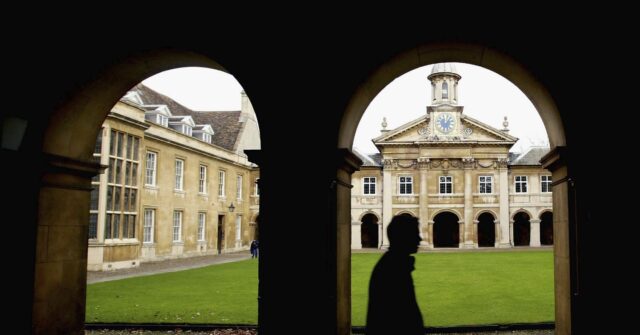Professor John Marenbon of Trinity College, Cambridge, has issued a grave warning about the current state of higher education in the United Kingdom, claiming that the rise of the woke ethos centered on diversity, equity, and inclusion (DEI) is endangering traditional academic values. Marenbon argues that this ideology threatens to transform universities into “empty shells,” diluting their foundational goal of knowledge pursuit. He emphasizes that freedom of speech, academic freedom, and the pursuit of truth are under attack from a far-left movement that prioritizes conformity over excellence. This shift, according to Marenbon, could lead to a decline in both the integrity of academic institutions and the quality of education they provide.
In his analysis for the Politeia think tank, Professor Marenbon expressed concern that DEI initiatives have been firmly established within universities, creating an environment where adherence to ideological principles is enforced by bureaucratic structures. This situation has resulted in the silencing of dissenting voices, with speakers barred for expressing views that contradict current narratives about gender and identity. Marenbon notes that the traditional concept of academic freedom, designed to safeguard academics from external pressures, has failed to protect them from internal conflicts among peers, creating an atmosphere where self-censorship prevails and genuine discourse is stifled.
The professor further argues that the woke ideology not only stifles free expression but also undermines the established hierarchy necessary for effective learning within universities. He asserts that students should respect their teachers and acknowledge their authority in the educational process. By diminishing this authority, the shift towards a DEI-centric model is impacting the quality of education, leading to a reversal of the traditional student-teacher relationship. According to Marenbon, the need for mutual respect and recognition of expertise is crucial for fostering an environment conducive to critical thinking and the pursuit of knowledge.
Marenbon goes on to critique the notion of inclusivity within academia, suggesting that it has become a hindrance to the pursuit of excellence. He proposes that universities must prioritize academic rigor and the disinterested search for knowledge over attempts to equalize opportunities among various demographic groups. The professor contends that universities should maintain exclusivity to ensure that only those capable of benefiting from their rigorous academic standards are admitted. This stance challenges the prevailing belief that diversity in student and faculty demographics is inherently beneficial, arguing instead that it may lead to compromised standards and reduced quality in education.
The professor sharply criticizes the UK government’s recent decision to repeal the Higher Education (Freedom of Speech) Act 2023, viewing it as illustrative of a broader decline in respect for academic freedom and free speech. He warns that the erosion of free speech on campuses could foreshadow larger societal implications, wherein academic silencing contributes to a general climate of repression and conformity. Marenbon posits that universities serve as bellwethers for freedom of expression in society, implying that if academic discourse can be curtailed, so can public discourse at large.
In conclusion, Professor Marenbon’s warnings illuminate the urgent challenges facing higher education in the UK amidst the rise of woke ideology. He calls for a reassessment of the priorities and principles that govern academic institutions, advocating for a renewed commitment to genuine academic freedom, the pursuit of knowledge, and the maintenance of intellectual hierarchies. By placing excellence above ideological conformity, Marenbon believes that universities can reclaim their traditional roles as bastions of knowledge and critical thought. The professor’s perspective serves as a call to action for those concerned about the future of higher education and its potential impact on society as a whole.

